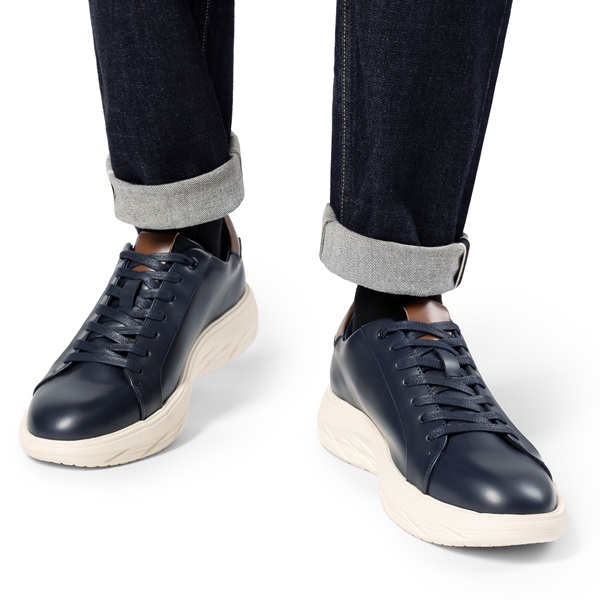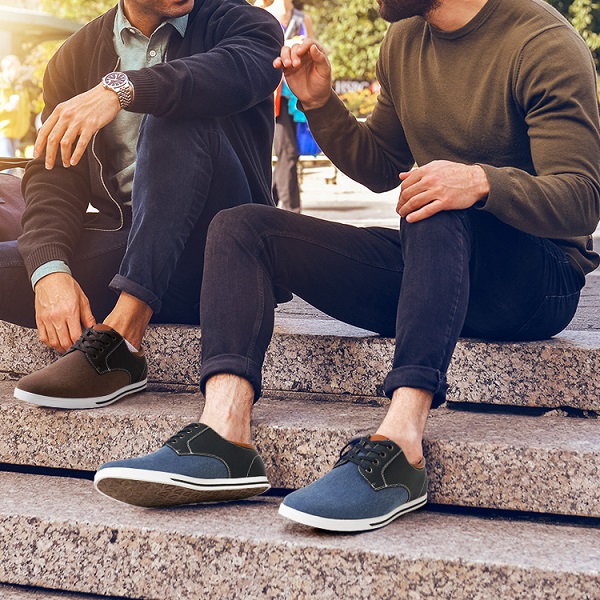Introduction:
The world of office dress codes has evolved drastically over the years. What was once considered appropriate business attire may no longer hold true in today’s modern workplace. One of the biggest debates in the corporate fashion world revolves around the acceptance of sneakers in a business casual setting.
Part 1: The Evolution of Office Dress Codes
Level 1: Historical Perspectives
- Explore the history of office dress codes, from the strict formality of the 1950s to the casual Fridays of the 1990s.
- Discuss how societal changes and technological advancements have influenced the way we dress for work.
Level 2: Modern Trends
- Analyze the current trends in office attire, including the rise of remote work and the blending of professional and casual styles.
- Examine the impact of startup culture and the tech industry on redefining what is considered appropriate office wear.
Part 2: Defining Business Casual
Level 1: Traditional Interpretations
- Discuss the traditional definition of business casual, which typically includes slacks, a button-up shirt, and dress shoes.
- Explore how business casual varies by industry, company, and geographic location.
Level 2: The Gray Area
- Debate the interpretation of business casual in the modern workplace and how it has become increasingly open to interpretation.
- Discuss the influence of millennial and Gen Z culture on reshaping workplace fashion norms.
Part 3: The Rise of Sneakers in Professional Attire
Level 1: Corporate Acceptance
- Examine how sneakers have gained acceptance in the corporate world, with major companies and executives embracing them as part of the business casual dress code.
- Discuss the impact of luxury sneaker brands and collaborations with high-end designers on the perception of sneakers as professional attire.
Level 2: Styling Tips
- Provide practical tips on how to style sneakers for a business casual environment, including pairing them with tailored trousers or a blazer.
- Discuss the importance of choosing clean, well-maintained sneakers and how to avoid overly casual styles in a professional setting.
Part 4: Debunking Fashion Myths
Level 1: Perception vs. Reality
- Challenge the notion that sneakers are inherently informal or unprofessional, highlighting the growing acceptance of non-traditional office attire.
- Discuss the role of personal expression and individual style in the workplace, and how it can coexist with professional expectations.
Level 2: Breaking Gender Norms
- Address the gender biases in workplace fashion, where men are often given more leeway in dress code interpretations compared to women.
- Explore how the acceptance of sneakers in business casual attire can help bridge the gender gap in office fashion expectations.
Part 5: Balancing Professionalism and Comfort
Level 1: Employee Morale and Productivity
- Discuss the link between comfort and productivity in the workplace, and how an overly rigid dress code can negatively impact employee morale.
- Highlight the importance of creating an inclusive and comfortable work environment for employees of all backgrounds and preferences.
Level 2: Embracing Diversity and Inclusion
- Explore the role of fashion in promoting diversity and inclusion in the workplace, and how allowing sneakers in business casual attire can contribute to a more inclusive environment.
- Discuss the potential benefits of a more flexible and modern approach to office attire, including attracting and retaining top talent in competitive industries.
Part 6: Finding the Right Sneakers for Business Casual
When it comes to choosing the right sneakers for a business casual environment, there are a few key factors to consider. First and foremost, the sneakers should be clean and well-maintained. This means no scuffs, stains, or visible wear and tear. Opt for classic styles and neutral colors like black, white, or gray, as these are more versatile and work well with a variety of outfits.
Additionally, look for sneakers made from high-quality materials like leather or suede, as these lend a more polished and professional look. Avoid overly athletic styles with bright colors, excessive branding, or flashy details. Instead, opt for minimalistic, sleek designs that are understated yet stylish.
It’s also important to consider the overall silhouette and shape of the sneakers. Avoid overly chunky or sporty styles, and instead, opt for streamlined and refined designs. Low-top sneakers are generally more appropriate for business casual settings, as they have a more formal and refined appearance than high-tops or bulky athletic shoes.
Ultimately, the goal is to find sneakers that strike the right balance between comfort, style, and professionalism. With the right pair of sneakers, you can navigate the business casual dress code with ease and confidence.
Part 7: Styling Sneakers for Business Casual
Once you’ve found the perfect pair of sneakers for a business casual environment, the next step is to style them appropriately. While sneakers may be a more casual footwear option, there are still ways to incorporate them into a polished and professional outfit.
One way to style sneakers for business casual is to pair them with tailored pieces, such as slim-fitting trousers or a blazer. This creates a balance between the casualness of the sneakers and the formalness of the rest of the outfit. For a more laid-back look, you can also opt for chinos or dark-wash jeans, paired with a button-up shirt or a lightweight sweater.
When it comes to footwear, the sneakers should be the focal point of the outfit. Keep the rest of your accessories and clothing minimal and understated to allow the sneakers to shine. Avoid wearing overly casual or athletic-inspired clothing, and instead, opt for pieces that have a more refined and sophisticated aesthetic.
Ultimately, the key to styling sneakers for business casual is to maintain a sense of balance and cohesion in your outfit. By pairing the right sneakers with complementary clothing and accessories, you can create a polished and professional look that is both comfortable and stylish.
Part 8: Embracing Sneakers in a Business Casual Environment
In today’s ever-evolving work culture, the line between formal and casual attire continues to blur. As a result, many workplaces have embraced the idea of incorporating sneakers into their business casual dress codes.
For employees, this shift towards more relaxed dress codes allows for greater comfort and self-expression without sacrificing professionalism. Sneakers have become a symbol of versatility, blending seamlessly into a variety of work environments and personal styles.
By acknowledging the role of sneakers in business casual attire, companies can foster a more inclusive and dynamic workplace culture. It’s an opportunity to embrace individuality and creativity, while still maintaining a sense of professionalism and respect for the workplace.
Ultimately, the acceptance of sneakers in a business casual environment reflects a broader shift towards a more modern and progressive approach to work attire. It’s about striking a balance between comfort, style, and professionalism, and recognizing that employees can present themselves in a way that feels authentic and true to their personal style. As the workplace continues to evolve, the acceptance of sneakers in business casual attire is a reflection of this changing landscape.
Conclusion:
Furthermore, the fashion industry has embraced the sneaker trend. With numerous brands creating more refined and sophisticated sneaker designs that are suitable for business casual settings. These elevated styles often feature premium materials and subtle branding. And giving professionals the option to maintain a polished appearance while wearing sneakers.
Overall, the versatility of sneakers in business casual environments is undeniable. Whether it’s for their practicality, style, or comfort, sneakers have proven to be a valuable addition to the modern professional’s wardrobe. With the right styling and choice of footwear, sneakers can offer a fresh and contemporary approach to business casual attire.
Can you wear sneakers for business casual? The debate over whether sneakers are appropriate for business casual attire continues to divide opinions in the corporate world. As workplace fashion norms evolve, it’s essential to balance professionalism with employee comfort and individual expression. Ultimately, the acceptance of sneakers in business casual attire reflects a broader shift towards a more inclusive and modern approach to office dress codes.



